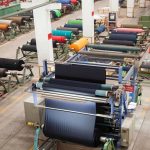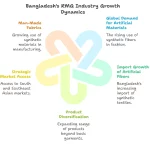The Swiss textile and garments industry looks back on a challenging year in terms of economic performance. The weakening of the world economy and seriously overvalued Swiss franc caused problems for the companies in this sector which are heavily dependent on exports. By comparison with the previous year, exports were 5.2% lower. Despite the difficult environment, value added in the branch rose by 1.4%. However, the prospects are not looking good. The world economy is set to remain fragile and there is little likelihood that the key reference currencies will strengthen. In this situation, the Textile Federation firmly advocates a minimum exchange rate of CHF 1.30 against the euro and much stronger action by the Swiss National Bank.Key data for the financial year 2011 :
The decline in exports of the Swiss textile and garments industry slowed in 2011, but exports were 5.2% lower by comparison with the previous year at CHF 2.99 billion. Imports were 1.1% lower at CHF 7.59 billion. The flatter decline in trade brought an increase in added value in 2011 by comparison with the previous year of 1.4% to CHF 1.19 billion.
Political challenge to the Federation :
The Chairman of the Swiss Textile Federation, Andreas Sallmann, attaches particular importance to the requirement for the Federation to communicate its wishes and needs clearly in future and show an active commitment to an improvement of the background conditions. In his view, the textile and garments industry must benefit from a better economic policy environment at both national and international level. Transparency and the greatest possible legal certainty were essential, especially for SMEs. As an example, Andreas Sallmann described the very difficult situation prevailing in the Euromed zone and the continuing absence of any link-up with the West Balkan States. As a result, little or no use was being made so far of the opportunities held out by this bilateral agreement.
No further limitations :
Flexibility and freedom to take decisions are two essential parameters for successful action in a difficult economic environment. The Swiss Textile Federation therefore firmly rejects the idea of State guaranteed minimum wages and the setting of an upper limit on remuneration. They would make the situation still more difficult without bringing any medium to long-term improvements for the workforce.
Reasonable sustainability :
Energy efficiency, sustainability and economical use of energy and resources are central concerns for the Swiss Textile Federation. But here too reason must prevail. In the manufacturing textile and garments industry, many processes require the intensive use of energy and resources. The implementation of a sustainable strategy across all production stages is time-consuming and costs a great deal. Our member companies are on the right track.
Further professional training :
In the year under review, our Federation was again committed to enhancing the attractiveness of further professional training. The emphasis here was placed on individual responsibility and the maintenance of a smoothly functioning and innovative further training market without the imposition of new obstacles by State regulations and distortions caused by cross-subsidies.
Innovation in “Haute couture and Ready-to-wear” :
Following the review of the previous financial year, two member companies gave an insight into their current and innovative projects. Martin Leuthold, Art Director of the Jakob Schlaepfer company, outlined «The future of couture», while Emanuel Forster, CEO of the Forster Rohner AG company, reported on the “Forster Rohner Mood Board S/S 12”.





